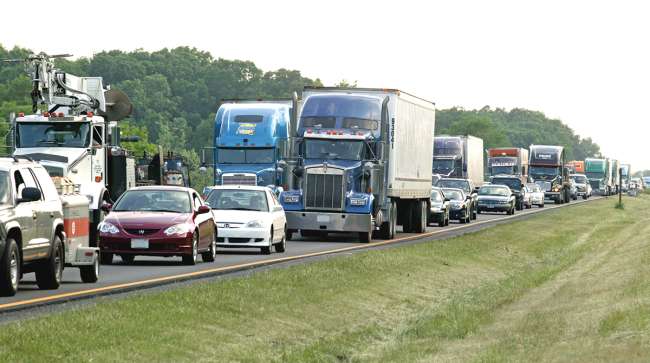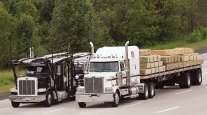Senior Reporter
Tonnage Drops 6.1% in May, ATA For-Hire Index Shows

[Stay on top of transportation news: Get TTNews in your inbox.]
Tonnage took a 6.1% decline in May, according to American Trucking Associations’ For Hire Truck Tonnage Index. Compared with May 2018, the seasonally adjusted index increased 0.9%, the smallest year-over-year gain since April 2017.
In May, the index equaled 114 (2015=100) compared with 121.4 in April, a month-to-month drop of 7.4%.
“As expected, tonnage corrected in May from the surprising surge in April. The economy is still growing, but the recent volatility in truck tonnage fits with a broader economy that is showing more mixed signals,” ATA Chief Economist Bob Costello said. “The good news is, if you ignore recent highs and lows, tonnage appears to be leveling off, albeit at a high level.”

Costello
The not seasonally adjusted index, which represents the change in tonnage actually hauled by the fleets before any seasonal adjustment, equaled 119.1 in May; that’s 1.4% above April’s level of 117.4.
Trucking serves as a barometer of the U.S. economy, representing 70.2% of tonnage carried by all modes of domestic freight transportation, including retail and manufactured goods. In 2017, trucks hauled 10.77 billion tons of freight, and motor carriers collected more than $700 billion, or 79.3% of total revenue earned by all transport modes.
Meanwhile, another major freight analyst, Cass Information Systems Inc., now believes the nation’s gross domestic product for the second quarter of 2019 may be negative. Most economists define a recession as an economic decline in which the GDP contracts in two consecutive quarters.
On June 18, the Cass Freight Index stated North American volumes declined in May, year-over-year, for the sixth straight month. May’s freight shipments were down 6% from 2018, and expenditures were down 1%. April’s report showed a drop of 3.2%.
The report said: “The weakness in spot market pricing for many transportation services, especially trucking, is consistent with the negative Cass Shipments Index and, along with airfreight and railroad volume data, strengthens our concerns about the economy and the risk of ongoing trade policy disputes. Weakness in commodity prices and the decline in interest rates have joined the chorus of signals calling for an economic contraction. Bottom line, more and more data is indicating that this is the beginning of an economic contraction.”
DAT Solutions says it is anxiously looking to see if spot truckload freight volumes rebound. The Beaverton, Ore., company provides a freight exchange or load board service.
“After a lackluster May, June is shaping up to be a pivotal month for trucking,” DAT senior industry analyst Mark Montague said in a news release. “We will soon know whether the volumes we expected in May were simply delayed. If so, the pent-up demand could boost seasonal volumes at the close of Q2.”

Montague
DAT said the number of full-truckload van loads fell by 12% in May compared with April. Van load counts also dropped by 10% compared with 2018. Van trailers are responsible for 70% of truckload freight.
Montague said uncertainty about the trade negotiations with China and extreme weather — especially in the Midwest — are impacting agriculture production and causing supply chain disruptions. Refrigerated volumes are down 8.3% month-over-month and 12% year-over-year.
“Simply put, May was a disappointment in terms of load counts. We’re accustomed to seeing higher volumes of retail goods, fresh produce, construction materials and other season spot truckload freight moving through supply chains at this time of year,” Montague said.
DAT said flatbed load volume dropped 9.3% month-over-month and 3.1% year-over-year. Spot load rates continue to be lower when compared with 2018. The national average spot van rate was $1.80 a mile, including a fuel surcharge, which is 35 cents below the figure from May 2018. The average reefer rate was $2.15 a mile, 38 cents off of last year’s rate, and the flatbed rate was $2.27 a mile, 45 cents lower than a year ago.




